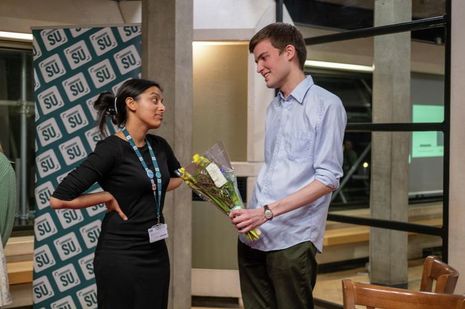Why doesn’t Cambridge care about student elections?
Varsity speaks to the student body to investigate voter turnout in SU elections

Student politics is well in season. Once again, budding politicians from the Student Union and the Cambridge Union are vying for your votes by campaigning tirelessly and working hard on their hustings speeches. But despite their dedication, there seems to be a disconnect between hopefuls and voters, with voter turnout in the SU support team elections down again this year to only 11.9% of the student population, from a high of 20.88% in 2020.
For an elected body which represents more than 24,000 students, this is a disappointing result. Varsity spoke to Cambridge students to get to the bottom of this decreased interest in student politics.
Of the people we spoke to, it seemed like an even split between those who did vote, and those who didn’t. However, most interviewees expressed indifference or a lack of familiarity with those on the support team at present, and what they have achieved so far.
“I have no idea what the SU does, who they are, and why I should care”
Only two of the 12 students interviewed knew who is currently in charge of the SU, and only one person was able to name an active achievement by the SU during their time at Cambridge: an in-person shadowing scheme. Even those who did vote in the SU elections seem to be in the dark about who the SU are and what they actually do.
When asked why they chose not to vote, this sentiment was repeated several times. One student said, “The SU have never had a physical presence in our college.” Another commented that they “have no idea what the SU does, who they are, and why I should care.”
Over half of those we spoke to about their priorities when it comes to SU representation mentioned the university’s climate policies, which the new SU undergraduate president Fergus Kirman said he was passionate about. But ultimately, as former treasurer of Christ’s JCR, his main priorities were more finance-oriented, such as working for tuition fee refunds from the University as a result of learning lost to strikes. In fact, it was Eve Blain, the candidate who missed out on the role this season, who placed the largest amount of focus on climate reform.
Most of those who did vote said that they based their decisions on the candidates’ manifestos, with several students communicating that this unfortunately seems to be the part of the campaign process least prioritised by the students running.
“An SU cannot be effective if the majority of its student body doesn’t know that it exists”
Almost every student we spoke to expressed scepticism about the campaign tactics employed by student politicians, with the word ‘hack’ being a popular one. Students complained that they “centre the individual over the committee” and that they felt that candidates use social media as “a game of who can annoy the most people into voting for them.”
Across the board, there were calls for more interaction with the student body, and more focus on tangible acts of change, rather than vague campaign rhetoric about vowing to be ‘transparent’ and to ‘work closely’ with other university institutions.
One student encapsulated the generally prevailing sentiment well, criticising the low voter turnout, but maintaining that, “this is simply not the students’ fault. An SU cannot be effective if the majority of its student body doesn’t know that it exists, let alone what it does for them.”
Complaints about the conduct of election candidates did not end with the SU. The concentration on social media as a medium for promotion is especially prevalent among the Cambridge Union committee nominees, about whom one student complained that, “You can usually find them lurking in your Instagram DMs asking you to vote for them, but providing absolutely no reason as to why you should do so.”
In his election campaign, Fergus Kirman vowed to make a change, to bridge the gap between the Student Union and the student body. Though it appears he might have a tough task on his hands–the vast majority of interviewees expressed a lack of certainty that they would vote in the next round of elections.
A spokesperson for the SU told Varsity: “Every candidate in our elections is asked to submit a manifesto so that voters are able to understand a candidate’s beliefs and goals.”
They continued: “One of the core goals of the SU is to continuously strive to reach out to more students from all across the student body. We will continue to work on issues that are important and relevant to our members, such as our work this year to tackle the cost of living crisis. It is of course disappointing to have not seen more students engage with the elections, and we are always looking for ways to improve not only voter turnout but overall engagement with the SU.”
 Features / Should I stay or should I go? Cambridge students and alumni reflect on how their memories stay with them15 December 2025
Features / Should I stay or should I go? Cambridge students and alumni reflect on how their memories stay with them15 December 2025 News / Dons warn PM about Vet School closure16 December 2025
News / Dons warn PM about Vet School closure16 December 2025 News / Cambridge study finds students learn better with notes than AI13 December 2025
News / Cambridge study finds students learn better with notes than AI13 December 2025 News / News In Brief: Michaelmas marriages, monogamous mammals, and messaging manipulation15 December 2025
News / News In Brief: Michaelmas marriages, monogamous mammals, and messaging manipulation15 December 2025 Comment / The magic of an eight-week term15 December 2025
Comment / The magic of an eight-week term15 December 2025









